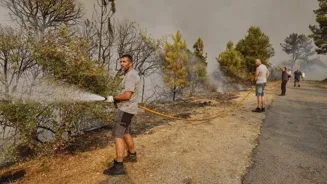Wildfires continue to sweep through southern Europe, with Spain, Portugal, and Greece battling some of the most destructive blazes in recent years. The
fires, due to soaring temperatures and dry winds, come during a summer of repeated heat waves that scientists link directly to climate change. Spain reported 14 active major fires on Friday, according to Virginia Barcones, head of the country’s emergency services. The national weather agency, AEMET, warned of "extreme fire risk" across most of the country. Prime Minister Pedro Sánchez cautioned that the weekend could bring more outbreaks, writing on X, "Today will once again be a very tough day, with an extreme risk of new fires." Portugal, meanwhile, mobilised nearly 4,000 firefighters to confront seven major blazes, extending its state of alert through Sunday. In Greece, crews fought flames for a fourth day on the island of Chios, where overnight evacuations underscored the danger despite calmer winds, reports AP.
Communities scarred and fearful
The damage has been devastating for communities caught in the path of the fires. In the Catalan mountain town of Paüls, residents are still shaken by a blaze last month that destroyed more than 3,000 hectares of land. "People were afraid that everything would burn and that they’d lose everything," said Enric Adell, the town’s mayor, reports The Guardian. "The fear of a fire like that is unlike any other kind of fear," added Adell.The fire left charred forests surrounding the town and claimed the life of firefighter Antonio Serrano, whose sacrifice has become a symbol of the struggle against worsening wildfires in Spain. Across Galicia and other regions, highways and high-speed rail lines have been forced to close, cutting off transport links as flames advance.
A regional crisis, a European response
The scale of this summer’s wildfires has prompted unprecedented requests for help from the European Union’s civil protection mechanism. Spain, for the first time, asked for firefighting aircraft from EU partners. Portugal followed suit, while Greece, Bulgaria, Montenegro, and Albania also called for assistance in recent weeks.The EU has already deployed its firefighting force as many times this season as during all of last year’s fire season, underscoring the rapid escalation of the crisis. Religious holidays such as the Feast of the Assumption in Catholic Spain and Portugal, and the Dormition of the Virgin Mary in Orthodox Greece, were overshadowed by emergency evacuations and smoke-filled skies.
Climate change and neglected landscape
Experts stress that these disasters are not isolated accidents but the predictable outcome of climate change and decades of poor land management. "Since 2017, we’ve seen this change towards more extreme fires," said Marc Castellnou, a senior forestry official in Catalonia, in comments cited by The Guardian. Longer heat waves, flash droughts, and abandoned rural lands have combined to create what scientists call a "Molotov cocktail" of conditions.The EU’s Copernicus Climate Change Service reported that Europe has been warming twice as fast as the global average since the 1980s. The year 2024 was the hottest on record globally, with Europe suffering its second-highest number of "heat stress" days.
In Spain, initiatives such as the "Fire Flocks" program, where shepherds graze goats and sheep to clear undergrowth, are being tested as a form of prevention. But experts warn that without fundamental changes to how land is managed, summer wildfires will only become fiercer.
In towns like Paüls, memories of orange skies and frantic evacuations are still raw. "When a fire hits," said Mayor Adell, "it really leaves its mark."














